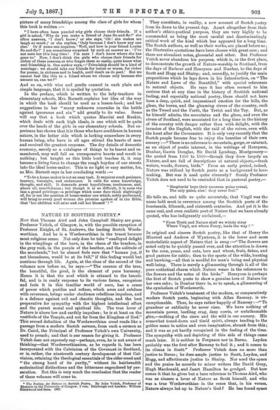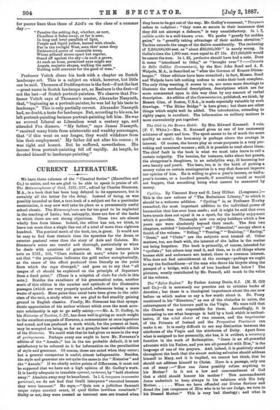NATURE. IN SCOTTISH POETRY.•
Now that Thomas Aird and John Campbell Shairp are gone, Professor Veitch, of Glasgow, is, with the possible exception of Professor Knight, of St. Andrews, the leading Scotch Words- worthian. And he is a Wordaworthian in the truest because most religions sense. Not only does he take "unalloyed delight in the wimplings of the burn, in the sheen of the bracken, in the grey rock, in the purple of the heather, and the solitude of the moorlands," but he almost feels sure that " human joy, if not blessedness, would be at its full," if this feeling would but continue through life. Again, at the close of the second of the volumes now before us, he says :—" The essence of the true, the beautiful, the good, is the element of pure harmony. Hence it is that the soul which is attuned to the beauti- ful, and is in ready response to its various forms, recognises and feels it in this familiar world of ours, has a sense of power which purifies and refines, which awes and subdues with reverence, brings under obedience rebellions impulses, and is a defence against evil and chaotic thoughts, and the best preparative for sympathy with the highest intellectual effort and the purest moral and spiritual life. The trite lover of Nature is above low and earthly impulses ; he is at least on the vestibule of the Temple, and not far from the Kingdom of God." This second definition of the Wordsworthian creed reads like a passage from a modern Scotch sermon, from such a sermon as Dr. Caird, the Principal of Professor Witch's own University, used to preach; and that is our reason for giving it. Professor Veitch does not expressly say—perhaps, even, he is not aware of thinking—that Wordeworthianism, as he regards it, has been incorporated with the Calvinism of the Covenant in Scotland, or is, rather, the nineteenth century development of that Cal- vinism, retaining the theological essentials of the older creed and " the strong hand of its purity," without its hairbreadth ecclesiastical distinctions and the bitterness engendered by per- secution. Bat this is very much the conclusion that the reader of these volumes will come to.
* The Frrlire for Nature in Scottish Poetry. By John Veitch, Pretense of Rhetoric in the University of Glasgow. 2 vols. Edinburgh and London: Blackwood and Bens. They constitute, in reality, a new account of Scotch poetry from its dawn to the present day. Apart altogether from their author's ethico-poetical purpose, they are very highly to be commended as being the most careful and discriminatingly critical work of the kind which has appeared for a long time. The Scotch authors, as well as their works, are placed before us ; the illustrative quotations have been chosen with great care ; and there are abundant notes, glossarial and other. But Professor Veitch never abandons his purpose, whioh is, in the first place, to demonstrate the growth of Nature-worship in Scotland, from the days of Barbour and Henryson and Dunbar, to the days of Scott and Hogg and Shairp; and, secondly, to justify the main propositions which he lays down in his Introduction, on "The Nature and Laws of the Beautiful," with special references to natural objects. He says it has often seemed to him curious that at any time in the history of Scottish national feeling, and especially national poetry, there should not have been a deep, quick, and impassioned emotion for the hills, the glens, the burns, and the gleaming rivers of the country, such as the Tweed and the Forth, the Teviot and the Tay. But, as he himself admits, the mountains and the glens, and even the rivers of Scotland, were associated for a long time in the history of the country with danger rather than with delight, with the invasion of the English, with the raid of the reiver, even with. the hunt after the Covenanter. It is only very recently that the Scotch people became free to enjoy the beauties of their own scenery :—" There is no reference to mountain, gorge, or cataract, as an object of poetic interest, in the writings of Henryson, Dunbar, Gawin Douglas, Sir David Lyndsay, Montgomery— the period from 1450 to 1560—though they drew largely on Nature, and are fall of descriptions of natural objects,—fresh waters, woods, flowers, birds." From an early period, indeed, Nature was utilised by Scotch poets as a background to love. making. But was- it used quite sincerely P Surely Professor Veitch does not need to be reminded that in pastoral poetry,— " Shepherds' boys their amorous pains reveal, The only pains, alas ! they never feel."
He tells us, and tells us quite accurately, that Virgil was the name held most in reverence among the Scottish poets of the fourteenth, fifteenth, and sixteenth centuries. And yet it is the same real, and even realistic poet of Nature that we have already quoted, who has indignantly exclaimed,—
" From Truth and Nature shall we widely stray Where Virgil, not where Fancy, leads the way ? "
In original and sincere Scotch poetry, like that of Henry the Minstrel and Andrew of Wyntonn, it is the lower and more materialistic aspect of Nature that is sung :—" The flowers are noted only to be quickly passed over, and the attention is drawn to the corn, pease, and oats, here and wheat, fruit, fishes, and good pasture for cattle; then to the sports of the wilds, hunting and hawking,—all that is needful for man's being and physical well-being. There is merely a glimmering through it all of the pure casthetical charm which Nature wears in the references to the flowers and the notes of the birds." Henryson is perhaps the first of Scotch poets to show a genuine love of Nature for her own sake; in Danbar there is, so to speak, a glimmering of the symbolism of Wordsworth.
Professor Witch's treatment of the modern, or comparatively modern Scotch poets, beginning with Allan Ramsay, is un- exceptionable. Thus, he says rather happily of Ramsay :—" To grandeur or sublimity he never rises. We have nothing of mountain power, beetling crag, deep corrie, or unfathomable glen,—nothing of the stern and the wild in our scenery. His somewhat toned-down and timid spirit, always tending to the golden mean in action and even imagination, shrank from this ; and it was as yet hardly recognised in the feeling of the time. The sympathy with and depicting of this side of things came much later. It is neither in Ferguson nor in Burns. Leyden probably was the first after Ramsay to feel it ; and it comes to its climax in Scott." Professor Veitch does no more than justice to Burns; he does ample justice to Scott, Leyden, and Hogg, and affectionate justice to Shairp. Nor need the space and the praise he accords to minor writers like David Grays Hugh Macdonald, and Janet Hamilton be grudged. But how comes it that he gives but a bare reference to Thomas Aird, who was as sinoere a lover of Nature as Scott himself, and who was a true Wordaworthian- in the sense that, in his verses, Nature always led up to Nature's God.? He has found space
for poorer lines than these of Aird's on the close of a summer day :— "Pensive the setting day, whether, as now, Cloudless it fades away, or far is seen, In long and level parallels of light, Purple and liquid yellow, barred with alms& Far in the twilight West, seen thro' some deep Embrownl,d grove of venerable trees, Whose pillared stems apart but regular, Stand of against the sky—in such a grove, At such an boor, permitted eyes might see Angels, majestic shapes, walking the earth Holding mild converse for the good of man."
Professor Veitch closes his book with a chapter on Scotch landscape art. This is a subject on which, however, but little can be said. Thomson of D nddingstone is the first—if not the last —great name in Scotch landscape art, as Raebnrn is the first—if not the last—of Scotch portrait-painters. We observe that Pro- fessor Veitch says of Thomson's master, Alexander Nasymth, that," beginning as a portrait-painter, he was led by his taste to landscape." This is only partially correct. Alexander Nasmyth had, no doubt, a taste for landscape. But, according to his son, he left portrait-painting because portrait-painting left him. He was an avowed Liberal as Liberalism went a century ago, and attended Fox dinners. "My father," says Tames Nasmyth, " received many hints from aristocratic and wealthy personages, that if this went on any longer, they would withdraw from him their employment.' My father did not alter his course ; it was right and honest. But he suffered, nevertheless. His income from portrait-painting fell off rapidly. At length, he devoted himself to landscape.painting."



































 Previous page
Previous page